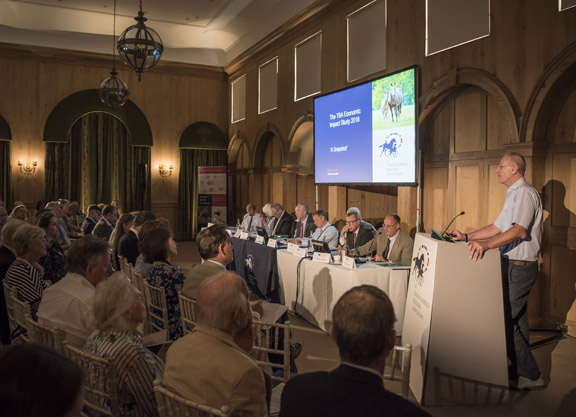By Emma Berry
NEWMARKET, UK—”An industry that has a seismic crack in it,” was how Thoroughbred Breeders' Association (TBA) board member Philip Newton described British breeding during an address to members at the 101st annual general meeting of the TBA on Thursday.
Newton's assertion was part of his overview of a recent Economic Impact Study undertaken by the TBA, the full results of which are yet to be published. In short, the review points to a “dire” situation for the smaller breeder in Britain, where breeders collectively can expect to receive 2% return on capital investment.
A similar study undertaken in 2014 highlighted the fact that 45% of British breeders operate at a loss. Just four years later that figure has risen to 66%. A total of 353 breeders, or 8%, have left the industry in the last five years.
“Many small to medium-sized breeders are facing extinction if the return on their investment does not improve,” Newton warned. “Breeders selling in Book 1 of the October Sale can expect to make on average a profit of £118,000, while those selling a Book 3 yearling are looking at an average loss of £23,500. The average loss to a breeder producing a National Hunt filly is £12,000.”
With a third of the British-bred foals being produced by breeders owning one or two mares, the TBA is naturally keen that the decline in the number of smaller British-based breeders—which currently stands at 3,318—is halted.
“We need 20,000 individual runners to sustain the British racing programme and roughly 50% of those currently are British-breds,” added Newton, who also pointed to the demand for horses bred in Britain and by its close neighbours, illustrated by the fact that members of more than 30 different nations were listed among the buyers at last week's July Sale at Tattersalls.
The implementation of bonus schemes is nothing new in the racing industry in Britain and beyond, but in order to try to help British breeders, the TBA has prepared a paper outlining a British-bred Premium Scheme, to some extent a beefed-up version of the Plus 10 Bonus Scheme, which it is hoped will be in place from 2019.
Detailing this proposal, which will need to be ratified by the wider racing industry, Newton's fellow board member Bryan Mayoh said, “The aim is to provide significant incentive, either for British-bred horses or for those sired by stallions standing in Britain, to encourage increased demand at the sales and increased participation by owner-breeders.”
With a nomination to be paid by the breeder, it is, to a degree, another form of self-help scheme, but one which it is hoped will be significantly boosted by Levy funding, with the aim being to have a pool of £7.75 million specifically targeted at British-bred or -sired horses. The small print has yet to be finalised, but it is proposed that horses carrying a GB suffix and by a British stallion would receive 100% of a bonus payment, while those bred in Britain by an outside stallion, or those by a British stallion but foaled elsewhere, would receive 50%. There would also be breeders' prizes of up to 20% of each bonus and no limit on the number of bonuses won.
Mayoh, the co-breeder of 2017 Cheltenham Gold Cup winner Sizing John (GB) (Midnight Legend {GB}), was the architect of the Mare Owners' Prize Scheme (MOPS), which was introduced two years ago by the TBA's National Hunt committee in order to help boost the popularity of jump-bred fillies at the sales. MOPS, which offers bonus payments of £5,000 for bumper winners and £10,000 for hurdles or steeplechase winners, is widely considered to have been a success, with the previously overlooked National Hunt filly foal or store now being given greater consideration at the sales by pinhookers and owners alike.
For the last two years in Britain, there has been no escaping the topic of Brexit, and the Thoroughbred industry is not exempt to the concerns regarding the implications of the country's departure from the European Union.
In his chairman's speech, Julian Richmond-Watson updated members on the TBA's attempts to encourage the upholding of the Tripartite Agreement. He said, “It was clear to us at an early stage that Brexit and the freedom of horse movement between Great Britain, France and Ireland was extremely important to TBA members and so we became involved from the start and have led negotiations with those two countries, Brussels and our own DEFRA. With the support of Weatherbys and the BHA we have made good progress in ensuring that everyone has a good understanding of the issues involved. This is not going to be easy and the politicians and Brussels can still cause us problems.”
The result of the election for two seats on the TBA board was announced at the AGM, with Bryan Mayoh being re-elected and Anita Wigan joining the board for the first time, replacing the retiring vice-chairman Paul Greeves.
Not a subscriber? Click here to sign up for the daily PDF or alerts.






